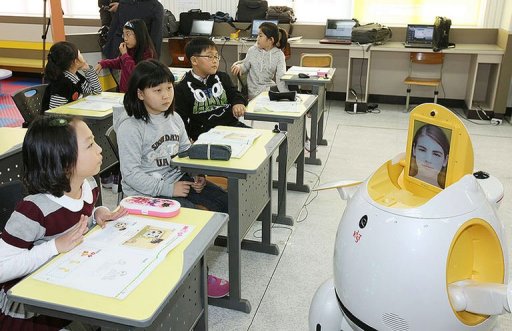
Right now in Japan thousands of English speaking, western foreigners teach English under the capacity of an ALT or Assistant Language Teacher. The ALTs role in the classroom varies from class to class. Some are just portable tape recorders that the Japanese teacher uses to speak fluent English on command. While on the other side of the spectrum you have ALTs that teach the whole class by themselves while the Japanese teacher sleeps in the back. Whatever the role their days in Japanese classes are numbered. A number of new technologies and trends are threatening to bring the world of the western teacher to an end.
The Universal Translator |
||
It’s only a matter of time before technology advances to a point where a small device can be either placed or implanted into someones ear. This device will translate all the world’s languages into your ear, real time, or at minimum have languages changed in and out as needed. Already at Google they are developing an application for their android phones that can translate in real time, although only Spanish is available in the phones Conversation mode.
| Why English teachers are safe for now | ||
Translating a language is incredibly difficult and as Google has noted, “Factors like regional accents, background noise or rapid speech may make it difficult to understand what you’re saying.” Also, while related languages like Spanish, French, German in the Indo-European language family are fairly easy to translate, languages such as Japanese are more difficult. But these are only temporary set backs. Once everyone has an ear piece that enables you to talk to anyone, in any language in the world, what is the point of learning English?
Robots, robots, robots |
||
A bean-counting administrator’s wet dream would be to have robots in every classroom. Ideally they would be independent self automating bots but even several remote robots controlled by one teacher preferably in a country with low minimum wage standards would be ideal for governments wanting to cut expensive education budgets. Think it’s science fiction? Korea right now is experimenting with 30 robots to teach English in classrooms around the country.

~Respect my robot authority~
| Why English teachers are safe for now | ||
No kid is going to take dictation from a robot that doesn’t interact with it. One teacher monitoring several robots will not be able to keep track of hundreds of students. But these are all obstacles that can be overcome. English teachers in Japan often just have students read and repeat what they say with approval of the Japanese teachers and the school. This role could easily be replaced with a robot, a realistic robot. Granted the Korean English-teaching robot, “Engkey”, looks like crap now but the technology can only improve and you have to keep in mind that Engkey is in operation in Korea where as Japan robot technology is light-years ahead.
Loosening of Visa rules |
||
For decades it has been incredibly difficult to work in Japan teaching English unless you are from a traditional English speaking country aka America, Canada, United Kingdom, etc. That is all changing as those from other less more non-traditional countries are increasingly being allowed into the country as long as they are providing proof they can speak advanced English. This means that teachers from Pakistan, Philippines, Portugal, etc are being allowed into the country and much to the distaste of those who presently teach these newcomers work for much lower wages, and less if any holidays. The argument for having these teachers is actually fairly strong as they, like the students they are expected to teach, often have learned English as a second language and so know the pitfalls and difficulties of learning a new language.
| Why English teachers are safe for now | ||
Luckily for English teachers the Japanese education system and Japanese themselves are just a little racist. They want blonde blue-eyed men and women teaching, in fact they prefer women. They might grasp that being white doesn’t make you a better teacher but Japanese parents don’t and in Japan education is a competitive business. If a parent sees one school has a white teacher who has a degree in geology but another Filipino teacher with a Masters in ESL, Toefl 9 times out of ten they will pick the white teacher.
A Scandal |
||
Japan has a large grey-zone when it comes to requirements for foreigners living in Japan. English teachers are not forced to join Japan’s expensive health care system. For some there is a relaxation in regards to encounters with the police. Foreigners can work outside of a pension system that Japanese are forced to pay into but most foreigners will never see any money as, English Teachers especially leave after a few years. That could all change if there was a major scandal involving ALTs.
In 2005 there was a major scandal in Korea when an English teacher in Korea used the Internet to post what amounted to a how-to guide for seducing Korean children. He said he did it as a joke but the the media seized on it and Korea went berserk and started cracking down on, and tightening rules regarding foreigners. Hundreds were arrested and other faced with daily harassment just left the country.
| Why English teachers are safe for now | ||
Korea with its large hated American military population have always associated foreigners with corruption, immoral behaviour and as just general assholes. Japan, except for maybe in Okinawa, doesn’t have this stereotype. In Japan we are regarded as clumsy oafs who don’t respect the culture but in a good way. Like a dog who can’t be blamed for tracking in mud from outside. But all it would take, is some sort of scandal for that attitude to change.
If this hasn’t scared you off check out how to become an English Teacher on our Tumblr page or read more Nonsense from GaijinAss by Checking out:
 |
 |
 |
 |
 |
| 7 Books for Warriors | Corn Soup Confessional | Cute vs Sexy | Kickboxing in Japan | 7 reasons not go to the clink in Japan |


I love this.
Well put together and addressing real time shit.
I think however, the title “The biggest threats to ALT’s in Japan” would have been more on point.
Robots cannot be substituted for human interaction. A robot could just as easily teach History, or Japanese language for that matter.
It seems likely that the act of every school having its own ALT will be abolished, and private schools or high end publics will have at least one or two full-time foreign teachers on staff. Fluent Japanese communicators that not only deliver language but also culture and would be excellent selling points in an educational system dominated by money and appearances.
By the time quality/affordable ear pieces and functionally capable robots are in schools our entire definition of traditional education will have been obliterated and made obsolete anyway.
Look that thinking (robots cannot replace humans) is similar to a child will never be raised by just a female. It was once thought that for a child to properly develope they had to have the input of a male and a female (and that the psychology of both played key roles in child rearing, something like the male teaches them to take chances, the female teaches restraint and together a good balance forms). Now we have countless people raised by just one parent (and the parent didnt try to fill any role of what was missing). In psychology experiments dogs and apes in their begining years would be placed with robot like manicans that either had a clock to produce a heart beat noise or were warm to simulate well warmth. They developed acceptibly. Since those begining psychology experiments many have been done on human children. Now some untrained F***s, lets call them american parents, decided television (of all the g** D***ed stupid ideas) could raise their kids just fine and at best scream goto your room (with a tv in the kids room). yes replacing people with robots is bad. NO its is not impossible and YES it will only happen in a matter of time.
sorry about the horrid paragraph/mess, I just wanted to get it typed and over with. I don’t mean to be an @$$ and contridict you here gaijin on your page (which I have a lot of respect for), I just have to agree with Yos here.
I think you have to muuch faith in humanity Gaijin. There is no low it won’t seek to given the chance.
First of all, I liked the part about Americans being viewed as clumsy oafs. haha
But secondly, I would like to mention that I work as an ALT and the part where you mentioned that foreigners are NOT forced to join Japan’s health care plan may be changing already. And the pension.
When I started my contract a year ago, there was nothing about either of these, although they told me they were trying to get something going.
Now last December, my boss came to talk to me and pretty much told me that starting this year all full-time employees are going to be mandatorily enrolled in the company health insurance AND pension.
She explained that I would have as much as ¥11,000/ month for health insurance and ¥20,000/month for the pension taken out of my paycheck. That’s ¥31,000/month! I was so frustrated when I found out because I’m leaving Japan in 2 months, so I won’t ever see that pension money, and it’s not like I use the health insurance. I tried asking her if I could opt out and she apologized and said no.
Anyhow, just wanted to let you know that some companies are already making it mandatory.
Yeah if you had paid in for a minimum of 6 months then you would have been able to get your pension money back. But it sounds like you’ll just be paying in for a few months.
Le tigre…I love your email address.
If I had met you when I was 12 and you were wearing a T-shirt that read “Karate Girl X” I likely would have spontaneously orgasm combusted all the colors of the rainbow and then proposed to you.
hahaha…I made that email address when I was 14…so yeah..pretty close. lol
And @yosomono…yep..just paying in not getting any back. oh well. =(
boo
It would take some robot to reproduce the education excellence of Finland. A country that has proven, if you invest in people, the whole country gets a return. The bean counters might get their, wankers often do, but if you’re focused on the bottom line, invariably in education, u get bottom drawer for the majority .. United Scraps of America springs to mind.
Seems the only thing septics wanna invest in..are dodgy derivatives that reward a few.. whilst the rest of the country slips further down the peggings of quality of life indices, that scandinavian nations dominate.
UNITED SCRAPS of AMERICA
R.I.P
It’s time real teachers .. gaba serfs fresh off the banana boat, not included .. unite and go on a cull.
Brothers unite! Take up arms and sweep away the likes of gaba! Purge these shores of the cancer of mediocrity that gaba personifies. They all have to..wear black there .. already dressed for their funerals.
ONE PUSH! ONE STRIKE!
BANANA BOATERS..
get on ya BIKE!
I have been writing a report on NCLB, or No Child Left Behind. It has destroyed American education. The children who were in the American education system while NCLB was in effect (it still is in effect at this time), will certainly go on to be some of the dumbest people the human race has ever produced.
The gap created in the workforce, when these poor children join it, will utterly destroy what is left of the shaky American economy. It will be a workforce of people who aren’t even educated enough to press the same button repeatedly.
Although I have not been there, in a long time. There seems to be a very clear “Anti-intellectual” movement in the states and I find that incredibly disturbing.
True enough, there are holes that need to be plugged. But do you really think the ENTIRE system is doomed? Are we just polishing the brass on the Titanic or what?
Can you imagine the further dereliction to septic education, if the tech geeks and bean counters, are allowed to realize their vision?
Kids at home in front of screens .. ear pieces and god speakers for richer ones.
How would a history lesson be broadcast ..?
Good morning children .. the world was made by someone in the sky and he put a man n a woman in a garden and we all come from these 2 people. Ignore any references to apes n evolution .. its all monkey business!
How about a science lesson .. ?
There is a man in the sky .. on the 7th day he said let there be light .. bingo! Don’t trouble your little minds with empirical data .. faith is all you need in today’s world .. and now to our sponsor Coca Cola.. providers of Americas holy water.
Of course christianity has been really positive to the spiritual and physical development of septics.
Take race relations .. a strong tree and a length of rope .. simple, right?
and all those born againers? Well .. they’re not going to heaven hungry, are they? .. Just vacuuming those gulp bucket o Pepsi n KFC.. eternity a long time you know! dont wanna famish! obesity .. such a small price.
Of course the benefit to the cabal of financiers and industrialists that run the US and fist you guys daily ..on the bottom line is, all the empty schools that become available for the crack community.
Now the inner city scraps have a place to smoke it up and die .. and when decay is complete, they’ll buy everything up for pennies, gentrify the hood and build a plush hotel for the next bilderburg meeting ..
Septics with a brain. take arms! unite! purge yourselves of these tapeworms!
ONE PUSH! ONE STRIKE!
Bilderbuggerers ..
get on ya bike
I find it telling that in studies now they have proven that the ingredients in Cola and Pepsi etc actually make children STUPID. Lovely. Thanks America.
The story of the garden of Eden, left out the STUPID TREE, septics fell from, hitting every branch on the way down.
NCLB? U.S. education is the one left behind …. the rest of the world.
The anti intellectual movement of the united scraps, was the landing of the PILGRIM FATHERS, and is the present citizenry.
I feel its unfair to blame Pepsi n Coca Cola..for this RETARDATION .. the problem quite clearly is biblical and goes back as old as time .. 5000 yrs ago , when the world was born .. made… by the mac daddy in the sky..
Nope. Before WW1 The USA was easily the richest nation on the planet with money to burn…until certain elements with a distinctive Hebrew way about them engineered a financial panic. Also, again, after WW2, wealthy and well off with a powerful manufacturing base and reasonable jobs. One could go work at the factory and own a house and two cars, just like both your neighbors did.
Not so anymore, and it has been a deliberate dismantling.
All this bullshit in the education sector- college prep programs. Yeah, so we can send our youth to a FOR PROFIT institution and eternally either in debt ourselves, or them, to the system. And for what? A Piece of paper saying they studied a bunch of useless shit well for 4 years?
Absurd. I would rather see my kid in an apprenticeship for 3 years, learning SKILLS and real world, workplace know how. “But…he will miss out on the college experience!!!” Who.gives.a.fuck? It’s a useless one, and if he’s hell bent on it, he can work for a while, save money, then go to college responsibly on his own dime.
HEY! Some of us are still in college in here…and its been more than a little difficult lately.
Yep, and how old are you?
Well, I am 32 and next fall I will have been going to college for two years. If all goes well I will be getting my two year arts and sciences degree and then transfering to a four year college with only two years left to go to get a directing degree. I feel like I am missing the point of your question though…
You are what I expressed that is preferred; go to school later in life if it’s something you are certain you want to do.
ahhhhhhhh
i see
wow, been using my brain so much that it seems to be overworked
yeah later in life
initially i had wanted to go the fall after my graduation from high school
i figured summer off then straight to college
but i knew even then that it was exactly what i wanted to do
i ended up forced into a horrible job
still i knew eventually i wanted to go to college
back then my major and my end goal would have been different than now
had i gone earlier i would have been a psychologist
now i am far too old to get into a twelve year college program
but i still take every psychology and sociology class i can
i just love psychology
those can be very useful in any path you choose though
I agree man. I use it often.
Trades current available for septics in the united scraps ..
1. bend over boy for THE MAN
2. Prison inmate
3. electrician on death row
4. plumber in NYPD
5. torture .. renditioning
6. democracy promotion overseas .. M15 and night vision included
7. prison officer
8. scout for indians and chinese people to hand your jobs
9. door to door bible sales
10. brass polisher on titanic
11. food stamp recipient
12. truck driver for haliburton in Iraq
13. hamburger flipper
14. home n car repo
15. religious nutjob
16. shoe shiner for the bilderburgs
17. carpenter and or fisherman .. just like me m.c JC
It’s official! US is shoe shine capital of world. British comedian ricky gervais, first choice, for a really good shine, is the big apple! His shoes always come up shiny, like a ripe coxs or pippin over there.
The star is impressed by how the septics really put their back into the polish, all the more impressive since the nation is on its back
Is…someone picking a fight?
If any thing I think he is sugarcoating a sad reality… that said, if you’re going to pick a fight, then America is an easy target. We just have a Jerry Springer nature to us. Look how we got suckered into WWI… or cany one of the countless recent military engagements with absolutely no soul to them and what they are doing to the once proud and revered American soldier.
WW1, WW2, Vietnam, And our crap now.
Not picking a fight! just looking fwd to my shoes being shined .. state side
Certainly not knocking u.s military. they teach you a really good shine there ..
Now fetch ya shine box… Israel thanks u.s and Lord Balfour for Israel .. share in your pride .. in the philosophy you can always get,one..half of the poor .. septic military .. to kill the other half … Muslims!
Mozel Tov!
India and China conclude international shoe shine treaty with states.
trade minister for xuan jong in china, lee jin, sez, with the..low labour costs in states, it has become cheaper for working Chinese to have their shoes shined by Americans. Even allowing for shipping, the average Chinese is seeing a 20 to 30 per cent saving on his shine
Rajiv Gupta, trade minister for Punjab, announces food for shoe shine deal.
With increasing numbers of Americans suffering from food stamp cutbacks, members of the punjabi congress party decide to trade their regions signature basmati rice, for the one skill , u.s workforce still possesses .. a second to naan shoe shine .. oh, blimey!
There are quite a few English teaching jobs in Tokyo now since the tsunami in March last year& mass exodus of foreigners including teachers. I normally get email alerts for ALT jobs on alttokyo.com & now getting one a day. Many employment opportunities.
And yet the pay gets lower and lower every year
“They want blonde blue-eyed men and women teaching,”
what do you think about us non-white esl teachers from the US? are we still safe?